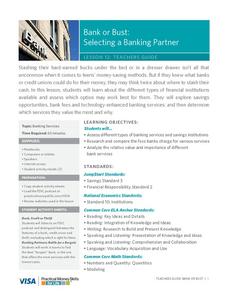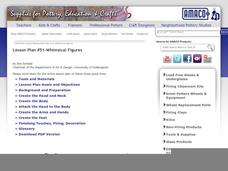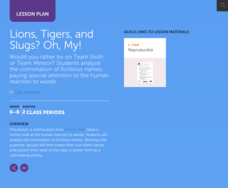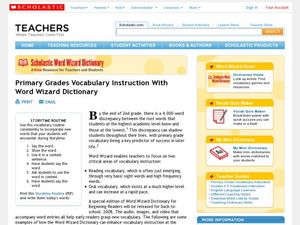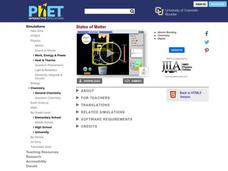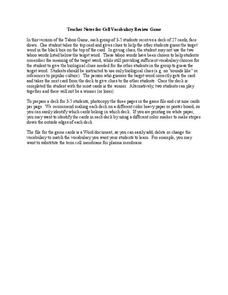Curated OER
Get the School Year Started Off Right!
Ten teacher tips to ensure a fresh, but smooth start to your school year.
Visa
Bank or Bust: Selecting a Banking Partner
Why shouldn't we just save all our money in our mattress? Couldn't our money disappear? Pupils discover the benefits of utilizing banks and credit unions for saving money, as well as how to evaluate different types of...
Curated OER
Solar Heat: Building and Testing a Solar Oven
Building a solar oven is always an enriching and engaging activity when your class is studying forms of energy or alternative and renewable energy sources. This lesson plan refers you to the re-energy.ca home website for specific...
AMCO
Whimsical Figures
Clay is a wonderful and expressive medium for learners of any age. Kids get creative as they make whimsical figures out of clay. A hyperlinked materials list, images of each step in the process, and helpful tips makes this a great art...
Curated OER
What a Character!
Guide your readers to explore character traits. As a class, discuss and record the traits of a commonly-known fairy tale character. Then do the same with the main character in the class novel. Finally, have learners use magazines...
Royal Shakespeare Company
RSC Activity Toolkit: The Merchant of Venice
Mercy! It's a wise teacher that knows their own students and what they need to appreciate Shakespeare's Merchant of Venice. A 28-page tool kit ensures that every scholar will play a part. The kit is divided into 20 sections, each of...
College Board
2015 AP® Physics 2: Algebra-Based Free-Response Questions
As one of the few AP tests that count for second year college course credit, the AP Physics 2 exam requires a higher level of knowledge than most. Help young scientists study for their upcoming AP Physics 2 exams with previous...
Howard Hughes Medical Institute
Testing a Hypothesis
Are sickle cell disease and malaria related somehow? Scholars learn about both illnesses and the hypotheses that they are related. They discuss, view a video, and answer questions to demonstrate understanding. The resource includes an...
Scholastic
Lions, Tigers, and Slugs? Oh, My!
Explore the power of words with your class by analyzing the connotations of fictitious sports team names. Learners discuss team names and the mental images they convey. They create logos to illustrate the meanings and...
Curated OER
Lesson 2 - Design Process-Measuring Wind Speed
A terrific lesson plan focused on the design process. It begins with a presentation, "Design: Solve a Problem," which lists the steps of the process and then introduces the specific challenge: to build a device that measures wind...
Curated OER
Primary Grades Vocabulary Instruction With Word Wizard Dictionary
Elementary schoolers discover that the world is at their fingertips as they acquire new vocabulary. Several suggested activities and strategies are provided here, building new reading and oral vocabulary.
American Chemical Society
Energy Foundations
Only 10 percent of an incandescent bulb's energy is used to create light; the remaining 90 percent is heat. In the unit of activities, young chemists examine energy through hands-on activities, videos, discussions, and...
Science 4 Inquiry
An Investigative Look at Florida's Sinkholes
In May of 1981, the Winter Park Sinkhole in Florida first appeared and is now referred to as Lake Rose. Scholars learn about the causes of sinkholes through an inquiry project. Then, they analyze recent data and draw conclusions to...
Science 4 Inquiry
Atmospheric Layers
Space diving refers to the act of jumping from outer space and falling through Earth's atmosphere before parachuting to land. Scholars learn about this extreme activity and study the layers of the atmosphere they must conquer in the...
Science 4 Inquiry
Edible Plate Tectonics
Many people think they can't observe plate tectonics, but thanks to GPS, we know that Australia moves at a rate of 2.7 inches per year, North America at 1 inches per year, and the Pacific plate at more than 3 inches per year! Scholars...
Science 4 Inquiry
Bubbles and Colors and Smells...Oh My!
A demonstration of elephant toothpaste hooks pupils' interest as they complete multiple experiments with colors, smells, bubbles, and more. By the end, they understand the differences between physical and chemical changes in the world...
Science 4 Inquiry
Musical Vibes with Palm Pipes
Ancient people used musical pipes as early as the third millennium BCE. Young scientists explore the workings of musical pipes to better understand the relationship with frequency, length of pipe, and sound waves. They determine the...
PhET
Acid-Base Solutions
Learners, through watching a simulation, can manipulate various characteristics of different solutions focusing on acid-base solutions where pH, strength of solution, and concentration may be changed. Views may be at the molecular...
National Nanotechnology Infrastructure Network
Noodling Around: Powers of Ten
How many noodles long is your classroom? Find out when engineers of all ages explore measurement through the use of pool noodles. With the noodles pre-cut to certain metric lengths, the activities could be used to introduce the metric...
Visa
Making it Work Together: Money and Roommates
Balancing money and first-time roommates can feel like a daunting prospect. Support your class members in understanding how financial agreements between roommates function, as well as the underlying importance of how to communicate about...
Visa
Nothing But Net: Understanding Your Take Home Pay
Introduce your young adults to the important understanding that the money they receive from their paychecks is a net amount as a result of deductions from taxes. Other topics covered include federal, state, Medicare and social...
PhET
States of Matter
Water is the only molecule on Earth that can naturally exist in all three states of matter. The interactive simulation shows different molecules changing states of matter with the addition or removal of heat. Learners then see how...
Science 4 Inquiry
Expanding the Universe
When Einstein first heard the theory of the expanding universe, he dismissed it as bad physics. Now scholars learn about the theory and how scientists prove it has merit. Through a hands-on simulation and videos, class members measure...
Serendip
Cell Vocabulary Review Game
Can science scholars describe a nucleus without mentioning DNA, or a chloroplast without mentioning the color green? Test their organelle understanding through an exciting card game. Groups take turns guessing the correct organelle or...



